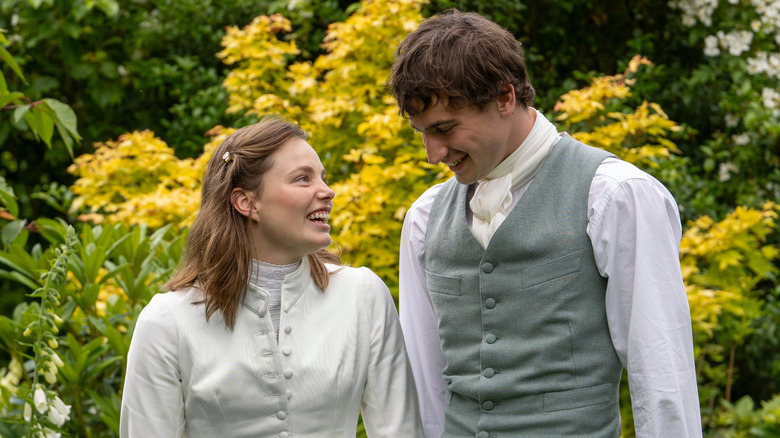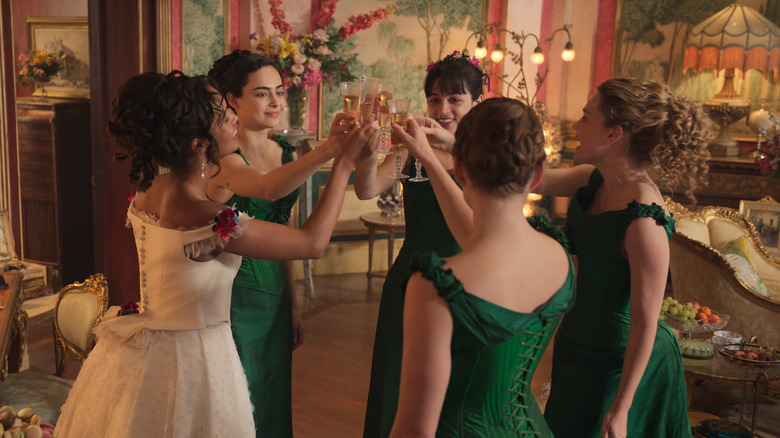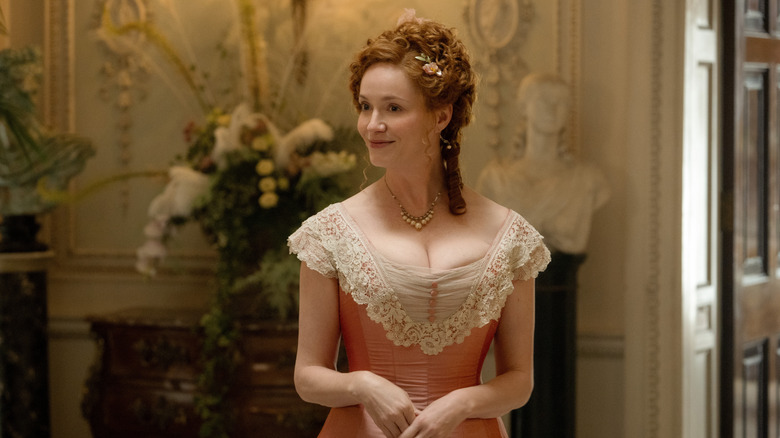The Buccaneers Review: A Middling Period Adaptation With Potential
- Plenty of interesting subplots with supporting characters
- Gorgeous landscapes and set pieces
- Central romance is underwritten
- Sorry, but Nan's hair is really bad
In a 19th-century marriage, love was not exactly the first consideration. Marriage was a transaction, and in the case of the wave of Anglo-American marriages that took place during the Gilded Age, an English gentleman could offer a respectable title in exchange for access to a young American heiress's vast fortune. "The Buccaneers," based on famed social satirist Edith Wharton's sadly unfinished novel, details the plight of five American girls husband-hunting in London. Because Wharton could not complete the story before she died, it bears all the hallmarks of a first draft, for better or worse.
Several key characters are disappointingly underdeveloped, and there are narrative issues that likely would have been smoothed out before publication. But the fact that there is some room for interpretation gives the writers of Apple TV+'s "The Buccaneers" more freedom than usual in adapting a historical novel for the screen. There are only eight episodes, and despite some wobbles, it seems as though the series is only beginning to tap into the storylines with the most potential.
The marriage market
"The Buccaneers" begins as the fiery Conchita (Alisha Boe) prepares to marry her Prince Charming, Lord Richard Marable (Josh Dylan). The two are madly in love with one another, so much so that it's easy for both of them to overlook the difficulties inherent in their marriage — namely, the reactions of his cold, proper English aristocrat parents when he brings home a free-spirited American girl as his wife. To ease her transition, she invites her friends to visit her in England, partially to bring some much-needed cheer to a stuffy manor, but also so that they might begin the process of finding titled British husbands for themselves. The four girls — Nan and Jinny St. George (Kristine Froseth and Imogen Waterhouse) and Lizzy and Mabel Elmsworth (Aubri Ibrag and Josie Totah) — are overjoyed at the exciting prospect. But their gateway into English society might not be everything they had dreamed of, especially for Nan, who immediately upon arriving in England learns an earth-shattering secret about herself.
What would a historical romance be without a love triangle? "The Buccaneers" places the forthright, extremely earnest Nan between two English gents: Theo, the Duke of Tintagel (Guy Remmers), who would like nothing more than to be freed from the responsibilities of his position and spend his time painting on the Cornish coast; and Guy Thwarte (Matthew Broome), a charming, extroverted man with a slight cash-flow issue. Unfortunately, there are a few problems with this. Both of the young lads don't have that much going on, character-wise, except for the fact that they both like Nan quite a bit. And frankly, the show doesn't do a good enough job of making one of the options significantly better than the other, so Nan ends up coming across as a little unfeeling for developing a romantic relationship with both of them.
Furthermore, Nan is clearly designed to be the central character of the show, but she's simply not compelling enough to support the weight of the entire narrative — it's easier to become invested in almost every other storyline. Mrs. St George's (Christina Hendricks) journey to independence? Yes, please. Jinny's relationship with the horrifyingly manipulative Lord Seadown (Barney Fishwick)? We're on the edge of our seats. Conchita struggling to find a place for herself in an English family that obviously looks down on her? Let's do it.
The modernization of the Gilded Age
"The Buccaneers" attempts to modernize a 19th-century setting, and it does so with mixed results. It takes a few cues from "Bridgerton" in attempting to brand itself as a little bit steamier and edgier than the traditional historical adaptation. However, this production is much tamer than its Netflix predecessor. It uses anachronistic music throughout the show, and the American girls speak in a cadence that is not what we might call period-accurate. This seems intentional, as a way to show that they are a wave of the future set loose on British shores. Although it's initially jarring, you get used to it fairly quickly.
Although the sets and landscapes are appropriately lavish, "The Buccaneers" is frequently let down by its costuming and hair design, particularly with Nan. In an era in which the whole point of going to England was to put American splendor on display, it's hard to imagine anyone letting her attend a public event with limp hair worn down in a shoulder-length cut. Part of the appeal of these shows is the pageantry, and "The Buccaneers" doesn't quite live up to that.
If it gets a second season — something it's likely aiming for, given the way it ends — hopefully "The Buccaneers" will find a way to develop the characters the audience is most naturally drawn to. Many fascinating subplots flesh out the central narrative, and with only eight episodes, we don't even begin exploring some of them until the end of the season. There's promise here, with a likable cast, an open-ended storyline that the writers can do whatever they like with, and plenty of charm on display. As of now, it's a middling period offering, albeit one that has a lot of potential.
"The Buccaneers" premieres on Apple TV+ on November 8.


